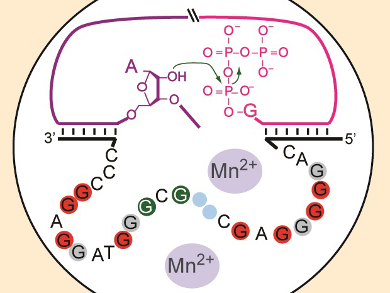Deoxyribozymes (DNA catalysts, DNA enzymes, DNAzymes) are synthetic single-stranded DNA molecules that catalyze a wide range of reactions. Catalytic DNAs are of practical value for the synthesis of structurally or topologically complex RNAs, but little is known about the molecular details of DNA catalysis.
Fatemeh Javadi-Zarnaghi and Claudia Höbartner, Max Planck Institute of Biophysical Chemistry, Frankfurt am Main, Germany, have investigated a deoxyribozyme that catalyzes the formation of a specific intramolecular 2’,5’-phosphodiester bond to produce lariat RNA, This is an important biological intermediate in eukaryotic mRNA splicing. The results of combinatorial mutation interference analysis (CoMA) allowed them to shrink the catalytic core, the part used in catalysis, to 70 % of its original length.
A striking feature of the minimized DNA enzymes is the high guanosine content of more than 50 %. Nucleotide analogue interference mapping (dNAIM) and dimethyl sulfate interference (DMSi) experiments provided atomic details of individual guanosine functional groups.
- Functional Hallmarks of a Catalytic DNA that Makes Lariat RNA,
Fatemeh Javadi-Zarnaghi, Claudia Höbartner,
Chem. Eur. J. 2015.
DOI: 10.1002/chem.201503238This article is soon to feature in Chemistry ‒ A European Journal‘s up-coming “Women in Chemistry” special issue




